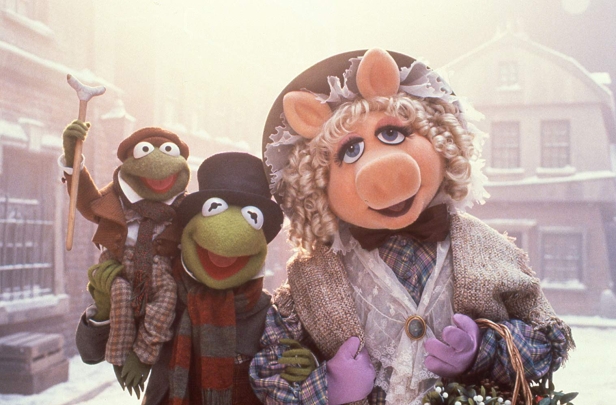Who would have thought that one of the best-loved versions of Charles Dickens’ A Christmas Carol would have turned out to be one from Disney featuring the Muppets? And yet here it is, the enduring and really rather wonderful The Muppet Christmas Carol, the first Muppet production made after the death of their creator Jim Henson (it was directed by Henson’s son, Brian).
The story, scripted by Muppet veteran Jerry Juhl, follows the novel a lot more closely than you might think yet still manages to find plenty of room for bot leading and cameo appearances from all your favourite Muppet characters. Michael Caine plays Scrooge and to the film’s advantage plays it perfectly straight throughout, seemingly unaware, or at the very least not caring, that the bulk of his co-stars are singing and dancing puppets. Caine makes for a good Ebenezer, not one from the top flight perhaps, but it’s a decent performance nonetheless, bringing some real emotion to Scrooge’s increasingly despairing long dark night of the soul.

The changes to the story are there to accommodate the Muppets and are generally well done and often very funny. To allow them to be played by everyone’s favourite hecklers Statler and Waldorf (who also seem to own a shop seen in the background near the end), Jacob Marley now has a ghostly brother, Robert – possibly a Bob Marley joke? Dickens himself turns up in the unlikely form of Gonzo (“A blue furry Charles Dickens who hangs out with a rat?” wonders his sidekick Rizzo the Rat) acting as an on-screen narrator, getting some great fourth-wall breaking business – at one point Rizzo wonders if things are getting too scary and Gonzo assures him “Nah, it’s all right. This is culture!”, only for them to abandon the film altogether when the creepy Ghost of Christmas Yet-to-come turns up (“Oh, this is too scary. I don’t think I wanna see any more!”). And in a pun that will infuriate as many as it pleases, Scrooge’s former employer Mr Fezziwig is played by Fozzie Bear so naturally becomes Mr Fozziwig.
There are a lot of songs written by Paul Williams, all of them nice enough but you’re unlikely to remember any of them once the film is over. But one in particular has become a bone of contention for the film’s most ardent fans. When The Muppet Christ,as Carol was first released to cinemas, it had one tune removed completely, a lament for what could have been sung by Belle (Meredith Braun) to a young Scrooge (Raymond Coulthard) titled When Love is Gone. But the song was removed before release on the orders of Disney executive Jeffrey Katzenberg who feared that younger children would be turned off by it. It was briefly re-instated for the 1993 VHS and LaserDisc releases and as part of the cropped, full-screen version featured as part of the DVD releases. But it again went AWOL when the film was released on blu-ray and given that the earlier releases are now out of print and that Disney have apparently mislaid the video master original film elements, it looks like a Love-less version of the film is all we’ve got today. The loss of the song robs the film of an important emotional beat and, although it can be heard over the end credits of the theatrical version (sung by Martina McBride), it now loses its connection with the final song, the redemptive The Love We Found.

Besides that, if the film has a flaw it’s that it is perhaps a little too reverent, a bit too in awe of the source novel. As a result, although there are moments of inspired lunacy, we never get the full strength Muppet madness. the characters being reined in for fear of treading on literary toes. This of course is a criticism that could be levelled at all post-Henson Muppet films but here a bit more of the crazed silliness that informed the television series (1976-1981) or the first three feature films, The Muppet Movie (1979), The Great Muppet Caper (1981) and The Muppets Take Manhattan (1984) wouldn’t have gone amiss. Everyone from the Swedish Chef to Animal gets their often very brief moment in the spotlight but perhaps fewer cameos and more silliness might have made it an even more enjoyably anarchic experience.
But The Muppet Christmas Carol is a fun take on the classic novel, often wittily scripted and with plenty of very funny moments. Caine is excellent (and, it seems, quite the fan of the film: “It’s a good, fun film for kids. And of course, it can never grow old, unlike me”), the puppetry is technically brilliant and it ends with Gonzo suggesting to the young audience that if they enjoyed this they might want to go and reads the book, harking back to the Muppet’s educational roots on Sesame Street (1969-), a very nice touch. It wasn’t the box office success that Disney hoped it would be (though it was very far from being a flop) but its appeal has endured and although it’s not the best adaptation of A Christmas Carol it’s head and shoulders above Disney’s subsequent crack at the story in 2009 and for many of a certain generation it remains the best-loved.